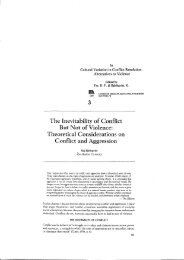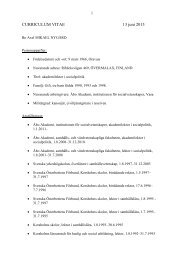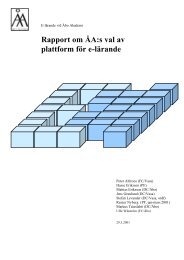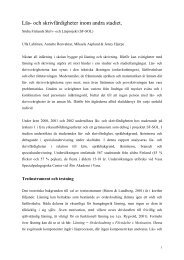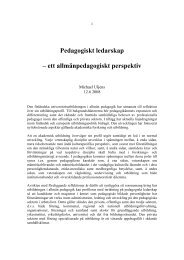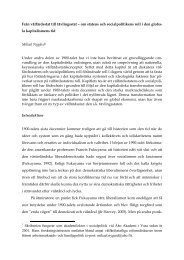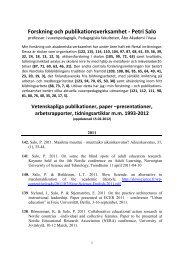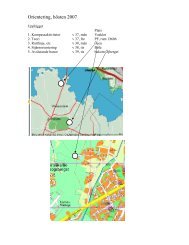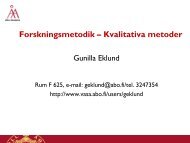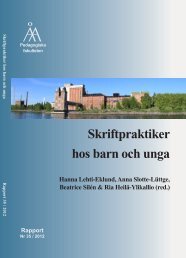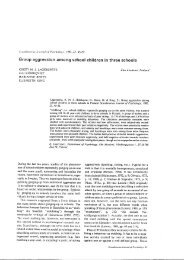Parties, Candidates and Citizens On-Line - Åbo Akademi
Parties, Candidates and Citizens On-Line - Åbo Akademi
Parties, Candidates and Citizens On-Line - Åbo Akademi
Create successful ePaper yourself
Turn your PDF publications into a flip-book with our unique Google optimized e-Paper software.
Hence, one must question whether these boards are really used by citizens. In this study,<br />
this central question will be answered through a quantitative investigation of Finnish<br />
discussion boards. In previous research, scholars have noted that politics on the internet,<br />
first <strong>and</strong> foremost, activates the already politically motivated citizens (see discussion<br />
below <strong>and</strong> e.g. Davis, 1999; Norris, 1999a; 1999b; 2001d). Does this also seem to be the<br />
case in Finl<strong>and</strong>, a country with one of the highest internet penetration rates in the world<br />
(Norris, 2001c: 26)? Are there signs of political mass meetings or are the discussion<br />
boards merely ‘social clubs’ for the motivated?<br />
1. Electronic discussion boards - two theories<br />
Concerning the citizens’ participation in electronic politics, two differing theoretical<br />
scenarios are usually discussed; the mobilization- <strong>and</strong> reinforcement theories (Norris,<br />
1999b). In the following section, these theories are discussed against the contextual<br />
background provided by electronic discussion boards.<br />
In essence, according to proponents of the mobilization theory, political activity<br />
on the internet constitutes a new, easily accessible, form of political participation. The<br />
internet lowers several barriers to citizens’ political participation. According to the<br />
proponents of the theory, easy access to the internet would result in attracting increasing<br />
numbers of citizens into political activity. <strong>Citizens</strong> who were previously motivated but<br />
perceived the step into political activity as too large <strong>and</strong> dem<strong>and</strong>ing have now found the<br />
ideal entrance into political life. This would be due to virtually zero costs associated with<br />
participation, the relative unimportance of time <strong>and</strong> spatial distance, in addition to the<br />
interactive opportunities available on-line (Coleman <strong>and</strong> Goetze, 2001: 5; Gibson et al.,<br />
2002; Norris, 1999a: 2-3; 1999b: 72; 2001d: 3). Moreover, the internet provides a<br />
communication channel through which the sender of a political message retains full<br />
control of the message, meaning that editorial intervention can thus be avoided (Berman<br />
<strong>and</strong> Witzner, 1997: 1313-1321; Djupsund <strong>and</strong> Carlson, 2003: 39-40; Gibson <strong>and</strong> Ward,<br />
1998: 15).<br />
The interest of this study, i.e. electronic debates, has also been considered from<br />
the point of view of mobilizing agents. Electronic discussion boards provide all citizens<br />
with an opportunity to engage in political discussions, anywhere <strong>and</strong> anytime (Bentivegna,<br />
1998: 8; Dahl, 1989: 519). Barber (1984: 151) states that the core of what he calls strong<br />
democracy is political participation through, among others, citizens’ discussions. Likewise,<br />
Budge argues that electronic debates are comparable to all other forms of political<br />
conversation. Budge states that electronic debates are one form of direct democracy<br />
(1996: 30):<br />
147



